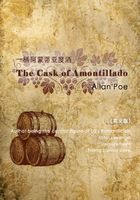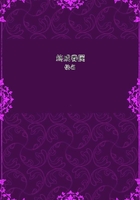GLOSSES ON THE CREATION STORY
(a) God created the Heavens from the light of His garment. When He spread them out like a cloth, they began to stretch farther and farther of their own accord, until He cried 'Enough!' He created Earth from the snow beneath His Divine Throne: throwing some of this on the waters, which froze and turned to dust. Earth and Sea also stretched farther and farther, until He cried 'Enough!'[30]
(b) Some, however, say that God wove together two skeins, one of fire and one of snow, for His creation of the world; and two more, of fire and water, for the creation of the Heavens. Others hold that the Heavens were made of snow alone.[31]
(c) Under the ancient rule of Water such disorder and chaos prevailed that wise men avoid all mention of it. 'Likening God to a king who has built his palace above a vast privy,' they say, 'would be apt but irreverent.'[32]
(d) God therefore banished Tohu and Bohu from Earth, though retaining them as two of five layers that separate the seven Earths. Tohu may be readily discerned as the horizon's thin green line from which, every evening, Darkness rises across the world. 'Bohu' is also the name given to certain glittering stones sunk in the abyss where Leviathan lurks.[33]
(e) God found the male Upper Waters and the female Lower Waters locked in a passionate embrace. 'Let one of you rise,' He ordered, 'and the other fall!' But they rose up together, whereupon God asked: 'Why did you both rise?' 'We are inseparable,' they answered with one voice. 'Leave us to our love!' God now stretched out His little finger and tore them apart; the Upper He lifted high, the Lower He cast down. To punish their defiance, God would have singed them with fire, had they not sued for mercy. He pardoned them on two conditions: that, at the Exodus, they would allow the Children of Israel to pass through dry-shod; and that they would prevent Jonah from fleeing by ship to Tarshish.[34]
(f) The divided Waters then voiced their agony of loss by blindly rushing towards each other, and flooding the mountain tops. But when the Lower Waters lapped at the very foot of God's throne, He shouted in anger and trampled them under His feet.[35]
(g) Others say that the Lower Waters, heart-broken at being no longer so close to God, shrieked: 'We have not been found worthy of our Maker's presence,' and tried to reach His throne as suppliants.[36]
(h) On the third day, when God set Himself to gather the Salt Waters in one place—thus letting dry land emerge—they protested: 'We cover the entire world, and even so lack elbow room; would you confine us still further?' Whereupon God kicked their leader Oceanus to death.[37]
(i) These difficulties past, God allotted a separate place to each body of Waters. Yet at the horizon they are parted by no more than the breadth of three narrow fingers.[38]
(j) At times, the Sea still menaces her barrier of sand. A seasoned mariner once told Rabbah of Babylon: 'The distance between one wave and its fellow may be three hundred leagues; and each may rise to a height of three hundred leagues also. Not long ago, a wave lifted our ship so close to a small star that it spread to the size of a field on which forty measures of mustard seed might grow. Had we risen higher yet, the star's breath would have scorched us. And we heard one wave call to its fellow: "Sister, is anything left in the world that you have not already swept away? If so, let me destroy it." But the wave answered: "Respect the power of our Lord, sister; we may not cross the barrier of sand by even the width of a thread…"'[39]
(k) God also forbade Tehom, the sweet Underground Waters, to rise up—except little by little; and enforced obedience by placing a sherd above her, on which He had engraved His Ineffable Name. This seal was removed once only: when mankind sinned in Noah's day. Thereupon Tehom united with the Upper Waters and together they flooded the earth.[40]
(l) Since then, Tehom has always crouched submissively in her deep abode like a huge beast, sending up springs to those who deserve them, and nourishing the tree roots. Though she thus influences man's fate, none may visit her recesses.[41]
(m) Tehom delivers three times more water to Earth than the rain. At the Feast of Tabernacles, Temple priests pour libations of wine and water on God's altar. Then Ridya, an angel shaped like a three-year-old heifer with cleft lips, commands Tehom: 'Let your springs rise!', and commands the Upper Waters: 'Let rain fall!'[42]
(n) Some say that a gem bearing the Messiah's name—which floated with the wind until the Altar of Sacrifice had been built on Mount Zion, and then came to rest there—was the first solid thing God created. Others, that it was the Foundation Rock supporting His altar; and that, when God restrained Tehom's waters, He engraved His forty-two-letter Name on its face, rather than on a sherd. Still others say that He cast the Rock into deep water and built land around, much as a child before birth grows from the navel outward; it remains the world's navel to this day.[43]
(o) Later, when Adam wondered how Light had been created, God gave him two stones—of Darkness and of the Shadow of Death—which he struck together. Fire issued from them. 'Thus it was done,' said God.[44]
***
1. In Ugaritic mythology, as in Hebrew, water always takes a dual form: thus there are two Floods, two Oceans, and two Deeps. Allusion is also made to the desire of the male waters for the female: when Kothar wa-Khasis built the Rain-god Baal's house, he was forbidden to open any windows through which the amorous Yamm ('the Sea') might catch sight of the god's two wives—Padriya ('Flashing One') daughter of Ar ('Light'), and Talliya ('Dewy') daughter of Rabb ('Distillation'). The house-walls were clouds, as in God's Celestial Pavilion (see 2. a). When about to attack Yamm, Baal 'opens a window within the house, makes rifts in the clouds, and gives forth his holy voice, which convulses the earth… so that the mountains quake…'
2. The metaphor of the king who built his palace above a privy may refer to male and female prostitution, and other Canaanite 'abominations' practised on Mount Zion in honour of Baal and Asherah, before the monotheistic reform of the Temple rites (2 Kings XXXIII. 4 ff).
3. Three-year-old heifers are widely associated with Moon-worship because their horns resemble a new moon and because the Moon has three phases. In Babylonian astrology (see 1. 14), the Moon held the planetary power of water; and, under Mosaic Law, perfect ritual cleanliness could be conveyed by a 'water of separation' (Numbers XIX. 2 ff) mixed with the ashes of a red heifer. Ridya's appearance as a heifer at Tabernacles, which introduces the rainy season, is therefore mythically apt.
4. The waters' plea for pardon when God threatened to singe them, is reminiscent of the Iliad where Hephaestus kindles a brush fire on Xanthus's banks and makes his waters boil until he surrenders. Yet a common source is possible: Homer's debt to Near Eastern myths has become yearly more apparent.
5. God's use of snow and fire for Creation may be derived from Psalm CXLVIII. 4–8:
Praise Him ye heavens of the firmament, and ye waters that be above the firmament.
Let them praise the name of the Lord, for He commanded and they were created.
He has established them for ever and for ever; He has made a decree which shall not pass.
Praise the Lord from the earth, ye dragons and all deeps,
Fire and hail, snow and vapours and a stormy wind fulfilling His word.
6. There are parallels in Egypt to the Jewish Temple legend that a rock on which the Sanctuary stood was the first solid thing created. The Pythoness's stone seat at Delphi also became known as 'the world's navel'.
7. Rabbah, a Babylonian Jew of the third century A.D., had travelled far. An apocryphal collection of his adventures recalls Lucian's early-second-century True History; but has a moralistic, rather than a satiric, intention.
8. The name of the God of Israel came to be regarded as too holy to be pronounced, except by the High Priest in the Holy of Holies on the Day of Atonement. In Talmudic times the sages entrusted their disciples once every seven years with the secret pronunciation of the Tetragrammaton YHWH (B. Kiddushin 71a), which otherwise was always spoken as Adonai. At the same time, twelve-letter, forty-two-letter and seventy-two-letter names of Yahweh, perhaps connected with Calendar Mysteries (Graves, White Goddess, ch. xvi) were also known to the initiated; when, however, these names were abused by sorcerers, they were suppressed, and only the more pious priests continued to use them when giving their benediction; but even so purposely sang them indistinctly, 'swallowing' some phonemes and expanding others into sustained melodious lines (B. Kiddushin, ibid.). This is reminiscent of the Egyptian ritual in which, according to Demetrius of Alexandria, the gods were celebrated with seven vowels sung in succession.
9. The allegory of the two stones from which Adam struck fire is based on Job XXVIII. 3:
Man setteth an end to darkness and searcheth out the furthest bound, the stones of thick darkness and of the shadow of death.
The midrash about the stone, rock or potsherd which God placed upon Tehom, thereby preventing her from rising up and flooding the earth, has a Sumerian prototype. An Enki-Ninhursag myth relates that the primeval waters of the Kur, or Nether World, rose violently to the surface, thus preventing any fresh waters from reaching fields and gardens. Thereupon Ninurta, god of the stormy South Wind and son of Enlil set a pile of stones over the Kur and restrained the flood.















